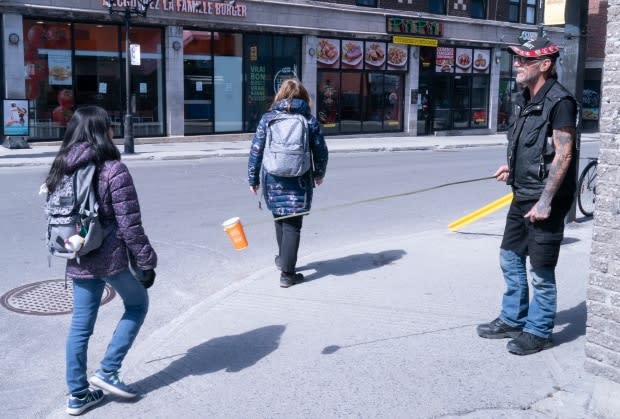Advocates call for moratorium on $1,500 fines to homeless who aren't physically distancing
One April evening, Lyn Black, an Anishinaabe outreach worker in Montreal, headed out with her business cards and baggies containing masks, looking for her clients — people living on the streets — to make sure they were up to date on how to stay safe in the COVID-19 pandemic.
Black, who is employed by the Indigenous Support Worker Program, was on the corner of St. Denis and Mont-Royal. That's normally a bustling intersection, but it was quiet in those early days of the lockdown.
In the distance, she spotted someone being loaded into an ambulance. A second person, standing close by, wasn't wearing a mask.
Black approached, handing her card to the person in distress and giving a mask to the second person, with instructions on how to use it.
Two Montreal police officers came up to them, she recalls, telling them to scatter. She resisted, saying she had the right to be there. She put a call out to Montreal's Indigenous liaison police officer, but it was after hours, and he missed her call.
When Black refused to leave, she said police patted her down, gave her a ticket and charged her with obstruction of justice.
Her boss couldn't believe it.
"She was completely astounded," Black said. "Like — what?"
Black was fined $1,500. She's contesting it, but if it sticks, her employer will pay it, she believes. That in itself is ironic, she says, because the Indigenous Support Worker program is funded by the city, as are the Montreal police who fined her.
Black also needs to hire a lawyer to fight the obstruction of justice charge. It's just one more stress she doesn't need right now: in the days after being charged, she tensed whenever she saw police, thinking of how they patted her down, in the midst of the pandemic, while she won't even hug her own daughter.
She realized she was experiencing the same kind of trauma that many of her clients live with.
Calls for moratorium on ticketing
Under the public health emergency decree that's in effect in this pandemic, police have the power to ticket anyone not observing the directives to stay two metres away from others in order to prevent the spread of COVID-19.
However, advocates for homeless people say those who spend their days on the street and the Indigenous support workers who look out for them are being ticketed too often — and unfairly.

Sarah Carrière, a community outreach worker at the First Peoples Justice Center of Montreal, said it's hard to keep track of exactly how many tickets are being issued, because recipients are simply throwing them away, assuming they will never be able to pay.
The excessive ticketing of marginalized Montrealers has been a source of controversy since long before the appearance of the coronavirus. Advocates for the homeless say some people have stacks of unpaid tickets for loitering. They say it amounts to criminalizing poverty, and they're calling for a moratorium on ticketing,
If tickets for loitering can't be paid, there's even less chance that tickets for failing to comply with physical-distancing rules will be — they can run as high as $1,500.
"We know these tickets are never going to get paid," said Jessica Quijano, the co-ordinator of the Iskweu Project, a program run out of the Montreal Native Women's Shelter.
"It's just a joke."
That sentiment was echoed by Marcelle Durrum, a therapist who works with the Native Women's Shelter, which is temporarily closed because some staff members are infected.
"One client was telling me, 'Oh, I just started to laugh.… Like, sure, you know, I can't even take the Metro. Sure, I'll pay $1,500,'" said Durrum.
Gathering for protection
There are good reasons why people who are homeless stick together, said Durrum.
When the pandemic hit in mid-March, it was still cold, and some people huddled together for warmth, Durrum said. People dealing with addictions sometimes use drugs together to look out for each other, in case of an overdose.
And women who live on the street are encouraged to stay in groups, to mitigate the risk of assault.
Advocates say police need to recognize the reasons vulnerable street people gather, ticketing less and offering more support.
Montreal Police Insp. André Durocher would not comment on the case of Black, the Indigenous support worker who was ticketed, saying he doesn't discuss individual interventions. However, he said police take into consideration the circumstances of the people they're ticketing.
People living on the street often have mental health problems, he said.
"The first step will be to try and get them to understand," said Durocher.
But he doesn't deny officers are ticketing homeless.
"There will always be cases where we have no choice," he said.
Montreal Mayor Valérie Plante said ticketing homeless people should be considered a last resort.
"We don't want to marginalize them even more by giving them a ticket. It's never the first option," Plante said Thursday.

